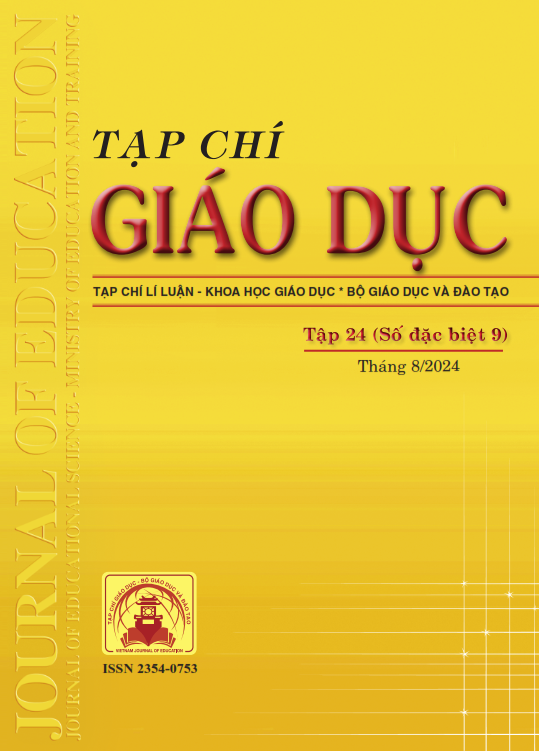Phát triển năng lực thích ứng cho sinh viên sư phạm trong bối cảnh chuyển đổi số hiện nay
Tóm tắt
The development of technology has had a substantial impact on different fields, including education. In this context, digital transformation is an essential step to help improve education quality today. Digital transformation applications help improve education quality and speed up progress in learning, providing new and different learning experiences and helping learners and teachers maximize their competences in learning, teaching, and the learning process. However, besides the primary benefits, digital transformation in education today also faces many difficulties and challenges, especially in teacher adaptation.. Accordingly, the article proposes some measures to develop adaptive competence - a necessary competence for students in general and pedagogical students in particular. The research results will be a valuable reference source to equip pedagogical students - future teachers with the necessary knowledge and skills to develop adaptive competence. At the same time, improve training quality in pedagogical schools as well as meet the requirements of training high-quality human resources in the context of digital transformation.
Tài liệu tham khảo
Bilyalova, A., Salimova, D., & Zelenina, T. (2020). Digital transformation in education. Integrated Science in Digital Age: ICIS 2019.
Didham, R. J., & Ofei-Manu, P. (2020). Adaptive capacity as an educational goal to advance policy for integrating DRR into quality education for sustainable development. International Journal of Disaster Risk Reduction, 47, 101631. https://doi.org/10.1016/j.ijdrr.2020.101631
Hoàng Hòa Bình (2015). Năng lực và đánh giá theo năng lực. Tạp chí Khoa học, Trường Đại học Sư phạm Thành phố Hồ Chí Minh, 6(71), 21-32.
Maussumbayev, R., Toleubekova, R., Kaziyev, K., Baibaktina, A., & Bekbauova, A. (2022). Development of research capacity of a future social pedagogue in the face of digital technologies. Education and Information Technologies, 27(5), 6947-6966. https://doi.org/10.1007/s10639-022-10901-3
Nguyễn Quốc Thái (2020). Cơ sở lí luận về thích ứng với hoạt động học tập của lưu học sinh. Tạp chí Khoa học, Trường Đại học Tây Bắc, 17, 103-111.
Nguyễn Thị Kim Dung, Đỗ Thị Thuận (2017). Tiêu chí đánh giá thích ứng nghề nghiệp của sinh viên sư phạm sau tốt nghiệp. Tạp chí Khoa học, Đại học Huế, 62, 200-206.
Nguyễn Thị Tuyết Hạnh (2017). Phát triển năng lực thích ứng cho đội ngũ giáo viên đáp ứng yêu cầu thực hiện nhiệm vụ giáo dục trong bối cảnh mới. Tạp chí Khoa học, Trường Đại học Đồng Tháp, 29, 30-36.
Oliveira, K. K., & De Souza, R. A. C. (2022). Digital Transformation towards Education 4.0. Informatics in Education. https://doi.org/10.15388/infedu.2022.13
Phạm Thị Thu Thảo (2022). Thực trạng đánh giá mức độ phát triển năng lực thích ứng với cuộc sống cho học sinh trong tổ chức hoạt động trải nghiệm theo chủ đề ở tiểu học. Tạp chí Khoa học Giáo dục Việt Nam, 18, 62-66.
Sych, T., Khrykov, Y., & Ptakhina, O. (2021). Digital transformation as the main condition for the development of modern higher education. Educational Technology Quarterly, 2, 293-309. https://doi.org/10.55056/etq.27
Tải xuống
Đã Xuất bản
Cách trích dẫn
Số
Chuyên mục
Giấy phép

Tác phẩm này được cấp phép theo Ghi nhận tác giả của Creative Commons Giấy phép quốc tế 4.0 .












